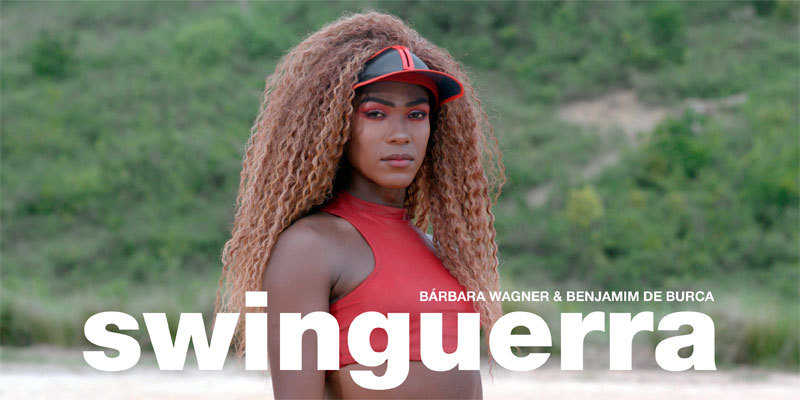Between May and December 2019, the two rooms of the Brazilian Pavilion in Venice will be transformed into a large installation created around the film debuting at the event,Swinguerra. The most recent project of the artist duo Bárbara Wagner & Benjamin de Burca (Brasília, 1980 / Munich, 1975) was begun upon receiving an invitation from Gabriel Pérez-Barreiro, appointed as curator by the Fundação Bienal, to hold a solo show as the official representation of Brazil at the world’s oldest art biennial. The show will consist of a two-channel video installation featuring the film commissioned for the occasion and, in the smaller room, a site-specific installation with portraits of the participants of the new work. The pavilion will thus reflect, in two different mediums, the same artwork.
Although its production began in late 2018, Swinguerra has been in gestation since 2015, when, during the research for their first audiovisual work, Faz que vai [Set to Go] (2015), the duo made contact with the dance trend known as swingueira. In this cultural phenomenon from Recife, dance groups consisting of from 10 to 50 people train rigorously to perform in annual competitions. “Swingueira is a sort of updating of a set of traditions such as square dancing, the samba school and the trio elétrico [mobile sound systems], practiced autonomously and independently by youths who get together regularly in sports courts on the outskirts of Recife,” explains Bárbara Wagner. “Born from the need for social integration, this phenomenon includes the experience of identity and has arrived at the stage and on Instagram as a sort of spectacle fed by the mainstream, but which survives absolutely outside of it,” she adds.
As in the duo’s previous works, Swinguerra takes the hybrid form of a musical documentary that creates an ambiguous space where fictional and documentary dimensions are blended, creating a third territory of language. The outcome of a collaborative and horizontal practice with the characters portrayed, the film accompanies rehearsals of three dance groups: aswingueira group; a brega group – a dance movement previously focused on by the duo in the film Estás vendo coisas / You Are Seeing Things (2016), commissioned by the Fundação Bienal for the 32nd Bienal de São Paulo; and a batidão do maloca group, a phenomenon that arose in 2018. “The actors participating in our films are people we know firsthand and with whom we collaborate for developing the film’s script. In the filmings, in front of the camera, the character they are playing is themselves, since this sort of knowledge carried in the body is what we want to analyze together with them,” the artist says.
“Swinguerra presents a profound and empathetic panorama of contemporary Brazilian culture, at a moment of significant political and social tension. The predominantly black bodies on the screen (many of them of nonbinary gender) are in many ways at the center of contemporary disputes on visibility, legal rights and self-representation,” says curator Gabriel Pérez-Barreiro. As in the duo’s other films, questions of gender, race, power and class are approached in a complex way, without reductionisms or taking of simple stands on the part of the actors. A common thread running through the film involves the economic flows that accompany the rise of these cultural phenomena, along with the personal conflicts faced by the dancers. These issues do not, however, configure the narrative, but rather constitute the backdrop of what is communicated by the bodies in the scene, their movements and the traditions that they share.
The official representation of Brazil at the 58th Venice Biennale is presented by the Fundação Bienal de São Paulo, the Ministry of Foreign Affairs and the Ministry of Citizenship.
Press information
Caroline Carrion: caroline.carrion@bienal.org.br / T +55 11 5576 7624
Felipe Taboada: felipe.taboada@bienal.org.br / T + 55 11 5576 7628


